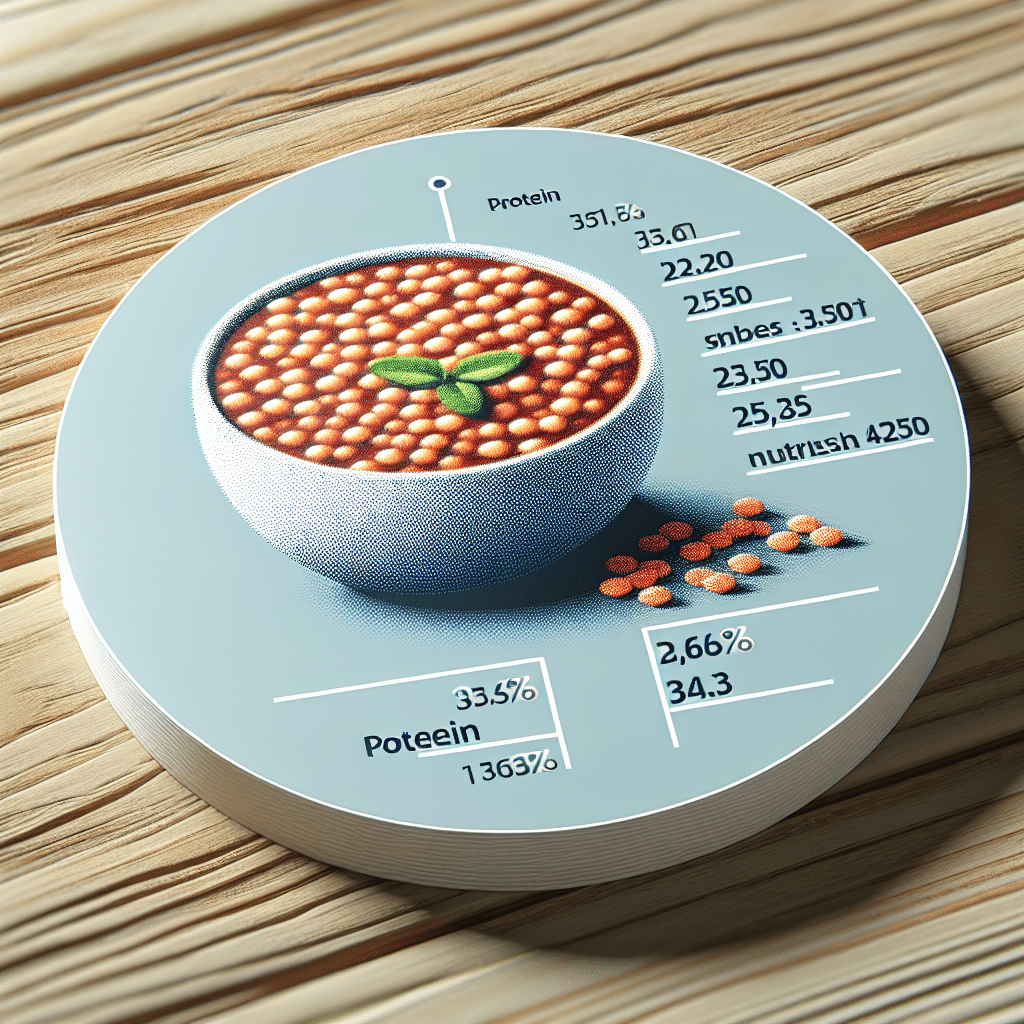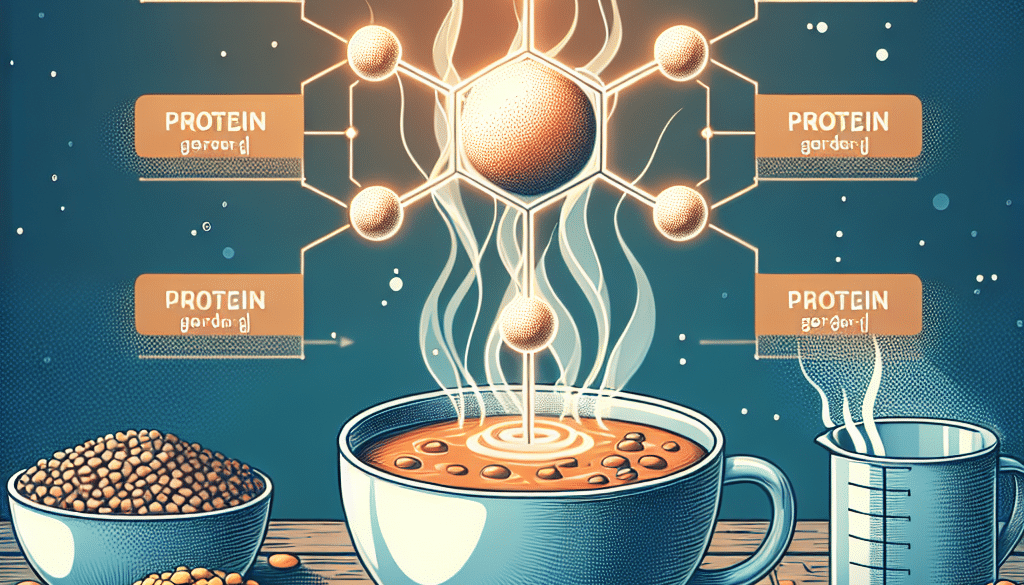How Much Protein is in Lentil Soup?
-
Table of Contents
- Protein Content in Lentil Soup: A Nutritional Breakdown
- Understanding the Nutritional Profile of Lentils
- Protein Content in Homemade Lentil Soup
- Factors Affecting Protein Content
- Protein Content in Commercial Lentil Soup
- Reading Nutrition Labels
- Benefits of Protein in Lentil Soup
- Incorporating Lentil Soup into Your Diet
- Conclusion: The Protein Powerhouse That Is Lentil Soup
- Discover ETprotein’s High-Quality Protein Products
Protein Content in Lentil Soup: A Nutritional Breakdown

Lentil soup is a hearty, nutritious dish that has been a staple in many cultures around the world. It’s known for its rich flavor, versatility, and high protein content, making it a popular choice for those looking to boost their protein intake through plant-based sources. In this article, we’ll explore the protein content in lentil soup, how it contributes to a balanced diet, and why it’s an excellent option for vegetarians, vegans, and meat-eaters alike.
Understanding the Nutritional Profile of Lentils
Lentils are a type of legume that come in various colors, including brown, green, red, and black. They are celebrated for their nutritional benefits, which include being a great source of protein, fiber, and essential nutrients. Before diving into the specifics of lentil soup, let’s examine the nutritional profile of lentils themselves.
- Protein: Lentils are an excellent source of plant-based protein. On average, 100 grams of cooked lentils contain about 9 grams of protein.
- Fiber: High in dietary fiber, lentils help promote digestive health and can aid in weight management.
- Vitamins and Minerals: Lentils are rich in B vitamins, iron, magnesium, potassium, and zinc, contributing to overall health and well-being.
- Low in Fat: Lentils are naturally low in fat, making them a heart-healthy addition to any diet.
Protein Content in Homemade Lentil Soup
When it comes to homemade lentil soup, the protein content can vary based on the recipe and serving size. A typical serving of homemade lentil soup, which is approximately one cup (240 ml), can contain anywhere from 6 to 18 grams of protein. This range depends on the concentration of lentils in the soup and whether additional protein-rich ingredients, such as meats or other legumes, are included.
Factors Affecting Protein Content
- Lentil-to-Liquid Ratio: A thicker soup with more lentils will have a higher protein content than a brothier soup with fewer lentils.
- Additional Ingredients: Adding ingredients like chicken, beef, or tofu can significantly increase the protein content of the soup.
- Recipe Variations: Some recipes call for blending the soup, which can affect the perceived density and protein per spoonful.
Protein Content in Commercial Lentil Soup
Commercially prepared lentil soups can also be a good source of protein, but it’s important to read the nutrition labels as the content can vary widely between brands. On average, commercial lentil soups contain about 5 to 9 grams of protein per cup. However, some brands may offer “high-protein” versions that include additional protein sources, potentially increasing the protein content to 10-20 grams per serving.
Reading Nutrition Labels
When selecting a commercial lentil soup, consider the following:
- Check the serving size to understand how much protein you’re getting per portion.
- Look for soups with whole food ingredients and minimal additives to maximize health benefits.
- Consider the sodium content, as some commercial soups can be high in salt.
Benefits of Protein in Lentil Soup
Protein is an essential macronutrient that plays a crucial role in building and repairing tissues, producing enzymes and hormones, and supporting immune function. Lentil soup, with its significant protein content, offers several health benefits:
- Supports Muscle Health: Protein is vital for muscle growth and maintenance, making lentil soup an excellent post-workout meal.
- Promotes Satiety: The combination of protein and fiber in lentils can help you feel full longer, aiding in weight management.
- Stabilizes Blood Sugar: Lentils have a low glycemic index, which helps maintain steady blood sugar levels.
- Vegetarian and Vegan-Friendly: Lentil soup is a plant-based protein source that fits into vegetarian and vegan diets.
Incorporating Lentil Soup into Your Diet
Lentil soup can be enjoyed as a main dish or a side and is versatile enough to be included in various meal plans. Here are some ideas for incorporating lentil soup into your diet:
- As a standalone meal with a slice of whole-grain bread for added fiber and nutrients.
- Paired with a salad for a light, protein-packed lunch.
- As a starter to a larger meal, providing a nutritious beginning to your dining experience.
Conclusion: The Protein Powerhouse That Is Lentil Soup
Lentil soup is more than just a comforting meal; it’s a protein powerhouse that can play a significant role in a healthy diet. Whether you’re making it from scratch or choosing a commercial option, lentil soup provides a substantial amount of plant-based protein along with other essential nutrients. By understanding the factors that affect its protein content and the benefits it offers, you can make informed choices about incorporating lentil soup into your meal planning.
Discover ETprotein’s High-Quality Protein Products
If you’re looking to enhance your protein intake further, consider exploring ETprotein’s range of plant-based protein products. Their selection includes organic rice protein, clear pea protein, and various seed proteins, all designed to meet your dietary needs. Whether you’re formulating new food products or seeking to enrich your personal diet, ETprotein offers the quality and variety you need.
About ETprotein:
ETprotein, a reputable plant protein vegan protein Chinese factory manufacturer and supplier, is renowned for producing, stocking, exporting, and delivering the highest quality organic bulk vegan protein and plant proteins. They include Organic rice protein, clear rice protein, pea protein, clear pea protein, watermelon seed protein, pumpkin seed protein, sunflower seed protein, mung bean protein, peanut protein etc. Their offerings, characterized by a neutral taste, non-GMO, allergen-free attributes, cater to a diverse range of industries. They serve nutraceutical, pharmaceutical, cosmeceutical, veterinary, as well as food and beverage finished product distributors, traders, and manufacturers across Europe, USA, Canada, Australia, Thailand, Japan, Korea, Brazil, and Chile, among others.
ETprotein specialization includes exporting and delivering tailor-made protein powder and finished nutritional supplements. Their extensive product range covers sectors like Food and Beverage, Sports Nutrition, Weight Management, Dietary Supplements, Health and Wellness Products, and Infant Formula, ensuring comprehensive solutions to meet all your protein needs.
As a trusted company by leading global food and beverage brands and Fortune 500 companies, ETprotein reinforces China’s reputation in the global arena. For more information or to sample their products, please contact them and email sales(at)ETprotein.com today.












